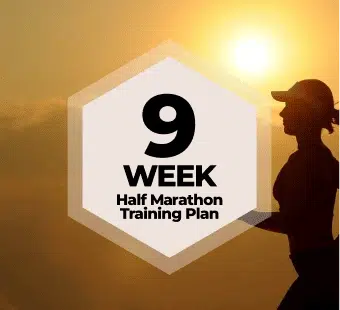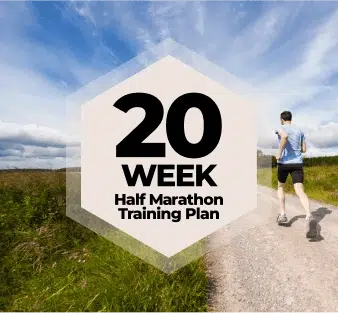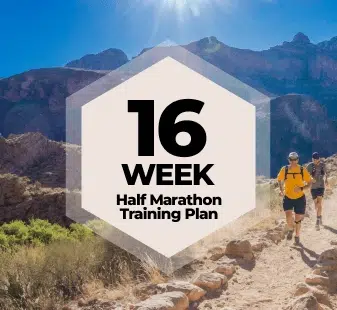If you’ve signed up to run a half marathon in a little over two months, congrats! If you’re already a regular runner, getting out there 2-3 times a week, you can definitely build up to 13.1 miles safely over the next nine weeks.
To be clear, 9 weeks is a short training block for any runner, but especially a beginner. This plan is based on the same schedule and expectations as our 8 week training plan – we’d like for you to already be able to run 4 miles to avoid injury in this shorter training block, says Becky Wade Firth, a pro-marathoner, cross-country running coach, and HMG writer.
If you aren’t already running but have a race in nine weeks, training with the run-walk method is your best bet for staying injury free while accomplishing your goals.
The below 9 week half marathon training plan has been approved by our running coaches and used by thousands of runners before you to much success. For just nine weeks, it’s super important you follow the plan to a tee. Your shorter, mid-week runs will help you build up your speed, while your longer weekend runs will help you build up your endurance.
To fool-proof your training, you can use an app like Runna which customizes and builds training plans for your level of fitness. Use code HALF for 2 weeks free.9-Week Half Marathon Training Plan
9-Week Half Marathon Training Plan
For a Saturday Race
| Week | Monday | Tuesday | Wednesday | Thursday | Friday | Saturday | Sunday |
| 1 | Off | 3 miles | 4 miles | 3 miles | Off | 5 miles | 2-3 miles |
| 2 | Off | 3 miles | 4 miles | 3 miles | Off | 6 miles | 2-3 miles |
| 3 | Off | 4 miles | 5 miles | 4 miles | Off | 7 miles | 2-3 miles |
| 4 | Off | 4 miles | 5 miles | 4 miles | Off | 8 miles | 3 miles |
| 5 | Off | 5 miles | 6 miles | 5 miles | Off | 9 miles | 3 miles |
| 6 | Off | 5 miles | 6 miles | 5 miles | Off | 10 miles | 3 miles |
| 7 | Off | 4 miles | 5 miles | 4 miles | Off | 11 miles | 3 miles |
| 8 | Off | 4 miles | 4 miles | 4 miles | Off | 12 miles | 2 miles |
| 9 | Off | 3-4 miles | 4 miles | 3-4 miles | Off | 13.1 miles | Off |
For a Sunday Race
| Week | Monday | Tuesday | Wednesday | Thursday | Friday | Saturday | Sunday |
| 1 | Off | 3 miles | 4 miles | 3 miles | Off | 2-3 miles | 5 miles |
| 2 | Off | 3 miles | 4 miles | 3 miles | Off | 2-3 miles | 6 miles |
| 3 | Off | 4 miles | 5 miles | 4 miles | Off | 2-3 miles | 7 miles |
| 4 | Off | 4 miles | 5 miles | 4 miles | Off | 3 miles | 8 miles |
| 5 | Off | 5 miles | 6 miles | 5 miles | Off | 3 miles | 9 miles |
| 6 | Off | 5 miles | 6 miles | 5 miles | Off | 3 miles | 10 miles |
| 7 | Off | 4 miles | 5 miles | 4 miles | Off | 3 miles | 11 miles |
| 8 | Off | 4 miles | 4 miles | 4 miles | Off | 2 miles | 12 miles |
| 9 | Off | 3-4 miles | 4 miles | 3-4 miles | Off | 2 miles | 13.1 miles |
About This Training Schedule
Who It’s for
This plan is designed for beginner to intermediate runners who are training for a race in a little over two months. You should already be running at least 2-3 days a week so you have a foundation of leg, lower body, and cardiovascular strength to handle the number of miles you’re about to run.
If you aren’t currently running regularly, ideally you have already raced a few shorter races such as 5Ks and 10Ks before starting this plan.
Injury Prevention
Like our 8-week program, this training plan is designed to help you increase your mileage safely in a short period of time. Still, overuse injuries are a risk for all distance runners, especially those who haven’t built up proper mileage before launching into a short training time frame like 9 weeks.
Overuse injuries like shin splints, runner’s knee, and plantar fasciitis can happen when too much training overwhelms the tendons and ligaments.
You can’t always prevent these running injuries, but you can lower your odds of being sidelined. Here’s how:
- Cross-train. At least one day each week that you don’t run, you should do cross-training in the form of spinning, swimming, or even the elliptical. This will help you train your cardiovascular system without the pounding impact that running can cause. If you’re prone to injury, you can also swap out your shorter run each week with a cross-training session of the same duration.
- Take rest days. You may think you should minimize rest days since you only have nine weeks to get race-ready. But you’re better off taking planned days off to rest and get more out of your runs. This also minimizes your risk of overuse injury. If you’re eager to get some movement in on your off days, you can flush out your legs with a walk, log a cross training session, or spend some time stretching.
- Strength train. While you can scrape by without it, strength training for runners can be hugely advantageous. You’ll build more power and muscular endurance for your runs and significantly reduce your risk of injury. Aim for one to two 30-minute sessions per week, ideally after a longer run (that same day or the next).
What to Eat
Eating enough while half marathon training is as important as the training itself. Proper fueling keeps energy levels up, optimizes performance, and speeds up your muscle recovery, helping you avoid fatigue and injury throughout your training plan. This last point is especially important when you’re on a tight timeline to train for a race.
To fuel effectively during a 9-week half marathon plan, aim for a macro ratio of:
- 50% carbs, which are your main energy source
- 25% protein, which aids in muscle repair
- 25% fats, which provide longer-lasting energy
Daily meals should focus on carb-rich foods like whole grains, fruits, and starchy veggies, paired with lean proteins and healthy fats.
For shorter runs (under an hour), your regular diet should suffice. For what to eat before longer runs (over an hour), increase your carb intake the day before to boost glycogen stores and then re-fuel with 30-60 grams of carbs per hour using gels, chews, or sports drinks.
Check out our full run-down of half marathon nutrition according to a sports dietician as well as the best snacks for runners and the best meals for runners.
More Half Marathon Training Plans
8 Weeks • 10 Weeks • 12 Weeks • 14 Weeks • 16 Weeks • 18 Weeks • 20 Weeks
–
We independently produce all the content associated with the training plans we feature on HalfMarathons.net. If you buy or sign up for services through the links on our site, we may receive an affiliate commission – which in turn supports our work.





